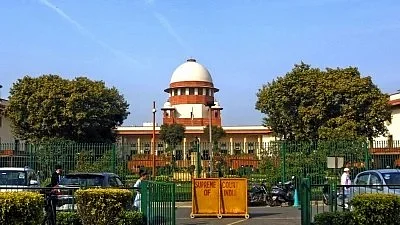States can't challenge Prez, governor's actions under Article 32: Centre to SC
The President has sought clarity from the SC on whether courts can set deadlines for the President or governors to act on Bills

The Central government informed the Supreme Court on Thursday that state governments cannot use writ jurisdiction to challenge actions taken by the President or a governor concerning Bills passed by state Assemblies, even if such actions allegedly violate fundamental rights.
During a hearing before a five-judge Constitution bench led by Chief Justice B.R. Gavai, solicitor-general Tushar Mehta, representing the Centre, argued that the President seeks the apex court’s opinion on whether states can file writ petitions under Article 32 of the Constitution on grounds of fundamental rights violations.
He further said the President wishes to understand the interpretation of Article 361, which grants immunity to the President and governors from being answerable to courts for acts carried out while discharging their official duties.
Addressing the bench — which also included Justices Surya Kant, Vikram Nath, P.S. Narasimha, and A.S. Chandurkar — Mehta explained that though these issues were considered during internal discussions, the President prefers a definitive ruling from the court, especially since similar questions may emerge in future.
Mehta asserted that states cannot maintain an Article 32 petition against the actions of the President or governors, stating such actions are not justiciable and that no directions can be issued to these Constitutional authorities.
"Article 32 lies when there is violation of fundamental rights and state government in the Constitutional scheme does not in itself have the fundamental right. It is a repository of functions which is to protect fundamental rights of its people," Mehta said.
Referring to the Supreme Court’s 8 April ruling involving Tamil Nadu, Mehta pointed out that the judgment had allowed states to approach the top court if governors delayed action on Bills. However, he questioned whether that principle should apply broadly.
In response, CJI Gavai remarked that while the court would not comment on the earlier two-judge ruling, "the governor would not be justified in sitting over the bill for six months".
Mehta countered that in a Constitutional framework, if one authority fails to act, it doesn't automatically permit the court to direct another to do so.
The CJI replied with a rhetorical question: "Yes. We know what your argument is. If this court does not decide the matter for 10 years, would it be justified for the President to issue an order?"
The case is still under hearing.
Earlier on 26 August, the court had posed critical questions about whether it should remain passive if a governor indefinitely delays giving assent to a Bill. It also questioned whether the discretion to withhold assent could be extended to financial legislation like money Bills.
These concerns arose as BJP-ruled states defended the independent roles of the President and governors in the legislative process, arguing that the judiciary cannot compel assent and warning against courts becoming a "pill for every disease".
At the core of the ongoing hearings is a Presidential reference made in May. President Droupadi Murmu invoked Article 143(1), seeking clarity from the Supreme Court on whether courts can set deadlines for the President or governors to act on Bills passed by state legislatures.
Follow us on: Facebook, Twitter, Google News, Instagram
Join our official telegram channel (@nationalherald) and stay updated with the latest headlines
